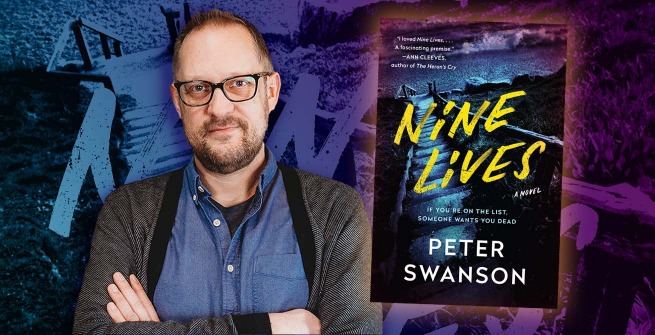Peter Swanson is the New York Times bestselling author of eight novels, including The Kind Worth Killing, winner of the New England Society Book Award, and finalist for the CWA Ian Fleming Steel Dagger; Her Every Fear, an NPR book of the year; Eight Perfect Murders, a Kirkus book of the year; and Every Vow You Break. His books have been translated into 30 languages, and his stories, poetry, and features have appeared in Asimov’s Science Fiction, The Atlantic Monthly, Measure, The Guardian, The Strand Magazine, and Yankee Magazine. He lives on the North Shore of Massachusetts. His latest novel is Nine Lives and he recently talked about it with Daryl Maxwell for the LAPL Blog.
What was your inspiration for Nine Lives?
For a long time I’ve been interested in doing a similar story to Agatha Christie’s And Then There Were None. I’ve always loved the kind of plotline in which strangers are being killed off one by one. There are so many levels of suspense: Why is this happening; who is the killer; and, also, who will be killed next?
Are Matthew, Jay, Ethan, Caroline, Frank, Alison, Arthur, Jack, Jessica, Sam, or any of the other characters in the novel inspired by or based on specific individuals?
I feel pretty confident in saying that, except for a minor character in my first novel, and a certain annoying customer in the fictional bookstore of Eight Perfect Murders, none of my characters are based on real people. That doesn’t mean I don’t pull traits here and there from people I’ve known in real life, or characters from films, but for the most part, my characters are truly figments of my imagination.
How did the novel evolve and change as you wrote and revised it? Are there any characters or scenes that were lost in the process that you wish had made it to the published version?
There was a very different draft of this story, early on, much shorter and more condensed. It was closer to a novella than a novel. It was my agent who convinced me that it should be novel-length. I’m glad he did because I ended up adding the character of Sam Hamilton, one of my favorites, to the story. I think the version that ended up getting published was the best version of this story.
Nine Lives, both references and pays homage to Agatha Christie’s And Then There Were None. Are you a fan of Christie’s work? Do you have a favorite of her novels?
Yes, I’ve been in love with Christie’s novels since I started reading them as a pre-teenager. And Then There Were None has always been my favorite of her books. Other ones I love include Death on the Nile, Crooked House, and Why Didn’t They Ask Evans?.
Do you have a favorite adaptation (television, motion picture or theatre production)?
The 1957 movie Witness for the Prosecution is based on Agatha Christie’s play of the same name. Billy Wilder directed it, and it’s excellent. Also, like all of Christie’s best work, it contains a stunning surprise.
What’s currently on your nightstand?
I’m in the middle of Jean Hanff Korelitz’s The Plot, a terrific thriller about plagiarism.
What is the last piece of art (music, movies, tv, more traditional art forms) that you've experienced or that has impacted you?
I really loved David Lowery’s film The Green Knight, a very strange, almost surreal, retelling of an Arthurian legend. I don’t think it’s for everyone, but I haven’t been able to stop thinking about it since I’ve seen it.
What are you working on now?
I’m busy editing my next novel, The Kind Worth Saving. It’s a semi-sequel to The Kind Worth Killing that brings back two characters, Henry Kimball and Lily Kintner, from that book.

